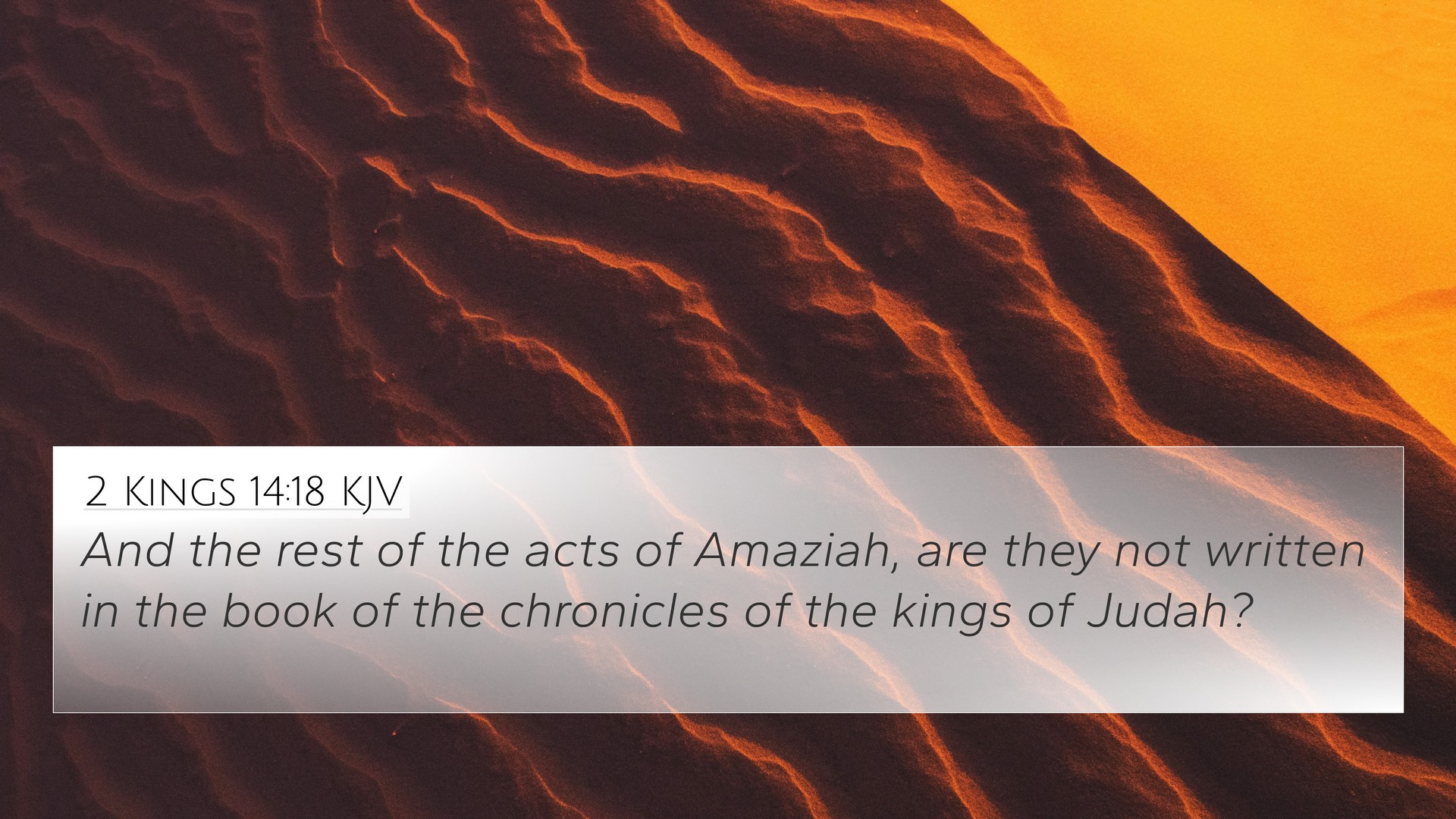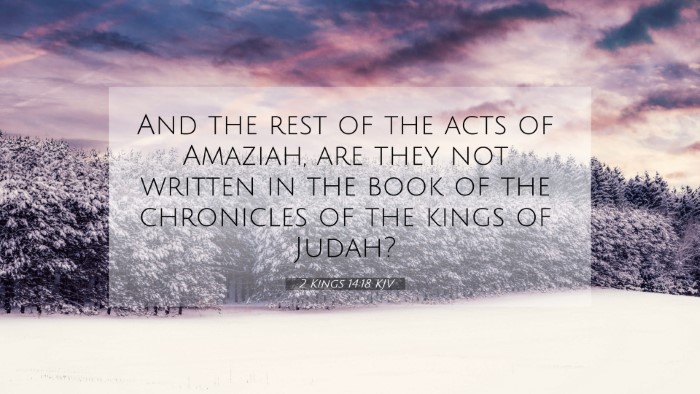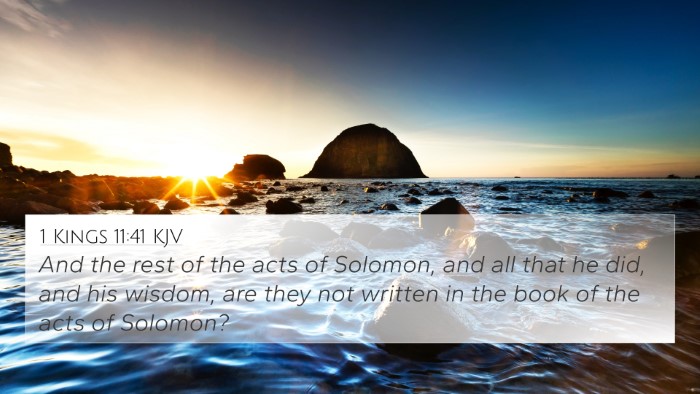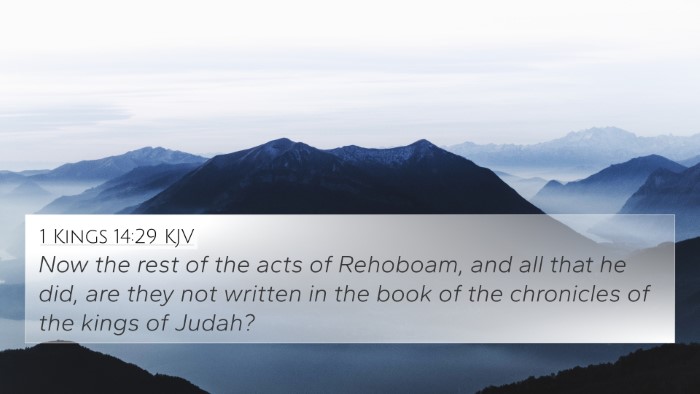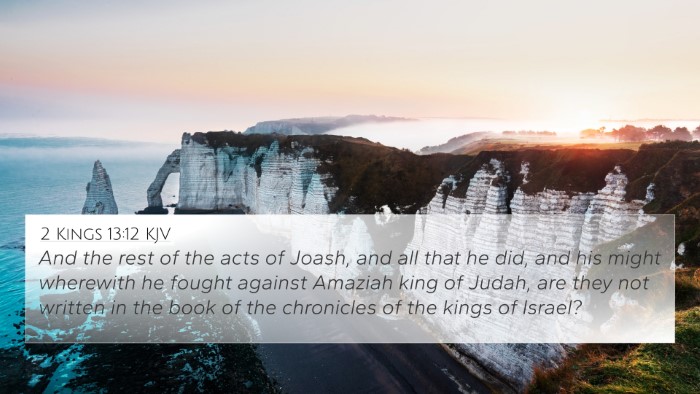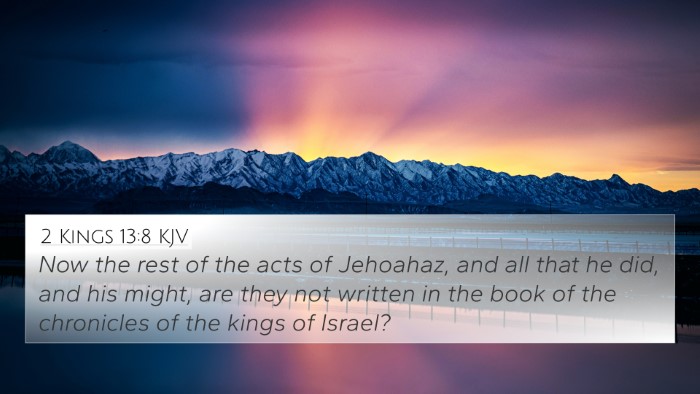Understanding 2 Kings 14:18
Verse: "And the rest of the acts of Jeroboam, and all that he did, and his might, how he warred, and how he recovered Damascus, and Hamath, which belonged to Judah, are they not written in the book of the chronicles of the kings of Israel?"
Overview of the Verse
This verse provides a brief summary of the reign of King Jeroboam II of Israel. It emphasizes his military achievements and success in recovering territories that were lost to Judah. This reference serves a dual purpose: to highlight Jeroboam's power and to direct readers to other historical records for further details.
Commentary Insights
In analyzing this verse, we can draw insights from notable public domain commentaries.
Matthew Henry’s Commentary
Matthew Henry highlights the importance of Jeroboam’s military campaigns, indicating that his efforts against Judah and his ability to recover important cities like Damascus and Hamath significantly elevated his status as a ruler. Henry also notes that the reference to the "book of the chronicles" suggests an acknowledgment of the historical records that document the events of Jeroboam's reign.
Albert Barnes’ Notes on the Bible
Albert Barnes emphasizes the notion of "the rest of the acts of Jeroboam," suggesting that the king's reign was marked by notable achievements that go beyond the scope of this single verse. He posits that understanding Jeroboam's actions necessitates consulting the historical records, which serve as a richer repository of knowledge concerning his reign and the political dynamics of the time.
Adam Clarke’s Commentary
Adam Clarke provides a historical perspective on the geopolitical context of the reign of Jeroboam II. He articulates the significance of the territories mentioned, particularly regarding Israel's relationship with Judah. Clarke underscores the military prowess demonstrated by Jeroboam in regaining these cities as a fulfillment of the prophetic declarations concerning Israel's restoration.
Thematic Connections
This verse can be understood within a broader thematic context of leadership, military succession, and territorial integrity in the history of Israel. It reflects the themes of divine providence and judgment that runs through the historical narratives of the kings of Israel and Judah.
Cross References
- 1 Kings 12:16-20 - The establishment of Jeroboam's rule and the division of the kingdom
- 2 Kings 13:19 - Acknowledgment of Jeroboam’s military achievements and the significance of prophetic lineage
- Amos 6:1 - A prophetic critique of the complacency of Israel during Jeroboam’s reign
- 2 Kings 15:1-5 - The continuation of the prophetic and historical narrative surrounding the kings of Israel
- 2 Kings 14:24 - Commentary on the broader implications of Jeroboam's actions
- 2 Chronicles 26:1-5 - A parallel in the reign of Uzziah in Judah and his military successes
- Micah 1:1-5 - Prophecies concerning both Israel and Judah during the time of Jeroboam II
Conclusion
2 Kings 14:18 encapsulates significant military and administrative aspects of King Jeroboam II's reign. By examining the cross-references and insights from commentaries, one can appreciate the interconnectedness of Biblical narratives, enriching one's understanding of Israel's historical context. The mention of additional records invites further study and offers an opportunity for deeper engagement with the Scriptures.
Exploring Bible Verse Connections
As you delve into 2 Kings 14:18, consider how this verse connects with others in different contexts. Such cross-referencing can reveal thematic and narrative parallels that enrich your study of the Bible.
Tools for Exploring Cross-References
Utilizing tools for Bible cross-referencing, such as Bible concordances and reference guides, can aid in discovering connections between various scriptures. Methods for cross-referencing can enhance your understanding of Biblical themes and provide context for sermon preparation or personal study.
Searching for Related Verses
If you are looking to find cross-references for 2 Kings 14:18, you might ask: what verses are related to Jeroboam's reign or his military accomplishments? Identifying such connections can lead to a deeper interpretation of the text and its implications.
